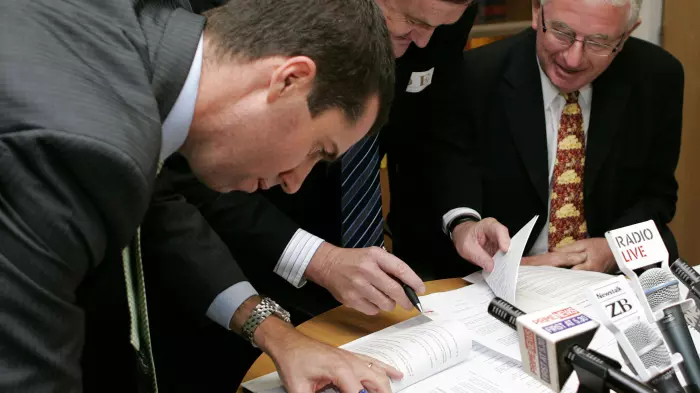BusinessDesk investments editor Frances Cook responds to emails from readers each week to answer questions about money. Below you'll find her expert advice. Send your own questions to [email protected].
Hello Frances,
Long time fan, first-time emailer.
I wondered if you had any advice for how to curb spending that draws on solid financial principles?
I keep trying to curb my shopping habits, but I still so often succumb to impulse buys and it's almost like trying to stop makes it worse – because the thrill of being naughty when I buy something is doubled.
I'm also sick of feeling guilty – I love beautiful things and I want to buy less but feel good about what I do choose to purchase, rather than a bit sick about the sheer volume of it all.
How can you rein in your spending while not falling into the trap of boom and bust?
Thank you!!
T
Hi T,
Your instinct is right – trying to go cold turkey on spending probably is making it worse.
However, that doesn’t mean you’re doomed to either be in a binge spending cycle or simply giving in and spending whatever with no restrictions at all. There is a bit of behavioural science out there to help us with this very common issue.
There’s even a name for what you’re experiencing – “scarcity mindset”. Once you mentally declare something off limits, it suddenly becomes more enticing, and you’re likely to think about it constantly until you cave in and get it.
Many of us have experienced this same problem in another area. Eating.
We decide it’s time to eat healthily, that it’s salad and soup from now on, and we do really well … for about three days.
By day two all you can think about is pizza, and by day four you snap out of a daze to find yourself halfway through your third doughnut.
Crash diets don’t work and neither do crash budgets.
We want to avoid you telling yourself that you can’t have something. The barely-evolved lizard brain part of you in the back of your mind takes it as a threat signal that you’re being deprived of something you need and will start constantly signalling you to go and find it.
Besides, you can have these things. We just want to have them in a healthy and controlled way that works for your budget. So we have a few different techniques to control spending without going cold turkey so that our lizard brain stays asleep.
Identify the problem
First, identify the areas of spending that you’re not happy with, or that are costing you the most money. This might mean sitting down and going through your bank account, and where your money has gone over the last month.
Next to each spend, note down if you needed to spend it, and if it made you happy. Keep it a judgement-free zone, as beating yourself over the head invites a scarcity mindset back into the mix!
Just did you need it, and did it make you happy? Then on to the next.
You might find things that you didn’t need, and that didn’t make you happy. That’s easy, they can go. Just remind yourself next time that they didn’t make you happy, and move on.
Now, what about the things that do make you happy? Can you indulge in them in a more manageable way?
For instance, I am shamelessly vain, and love to buy clothes. My husband is begrudgingly allowed two hangers in the wardrobe. I need the rest of it.
I can cut a lot of things out of my budget, but I get sad if I don’t have new clothes. However, it’s not exactly good for my budget, or the planet.
So what did I do? In 2020, I challenged myself to only buy secondhand clothes for that year. It drastically cut down how much I spent, and I felt better about it when I did buy something. Once I got into the habit, it didn’t even feel like a sacrifice.
I also enjoy café culture, but brunch adds up to be quite a lot. I find that going to a café and having a coffee, and potentially a slice is a fraction of the cost and gives me the same happiness hit of getting out of the house, seeing people, and eating something yummy.
So once you’ve identified your areas of happiness spending, how can you tweak them to get the same hit but in a more budget-friendly way?
Make sure it’s not about restricting or punishing yourself, just identifying which bits make you happy, and then the smartest way to continue getting it.
Reduce, don't cut
Then consider if you need to reduce how often you do that. It’s not about cutting it out, just about deciding what’s a manageable amount for your budget.
Even a small indulgence every day can add up quickly. But the same thing once a week is a treasured little hit of serotonin, without ruining your budget.
Another neat trick is to rotate what you cut back on each week, or month, whatever works for you.
So maybe no buying clothes for a week, but the social life continues. Then no beers after work for a week, but you allow yourself a "stuff" spend, which ends up being one more pot plant for the collection. You get the idea.
You never feel deprived overall, but by flexing your muscles for cutting back and having a clear deadline in sight, you remind yourself of what is actually adding to your life.
You break the habit of mindless treats, and when you actually do indulge again, you’re likely to enjoy it more after a break.
Make it visual
The last tip is paying with cash. Take out your spending money for the week, and once it’s gone, it’s gone.
Once again, it’s down to working with our lizard brains. When you pay with a card, particularly a credit card, it’s meaningless to us. It’s just one swipe, bam, and gone.
Handing over cash has a different mental impact, where you feel the ‘pain’ of payment more. Seeing the various notes leave your palm means you calculate the weight of different prices more accurately. You’re more likely to pause and ask yourself if you actually want to buy it.
The good news? If you don’t want it, you just saved yourself from an impulse purchase. If you do want it, your brain then wants to counteract the payment pain and is more likely to savour what you just bought, giving you more enjoyment from it.
The key with all of these techniques is as much a mindset shift as it is a spending one.
Don’t focus on what you’re giving up, because down that road lies a scarcity mindset, self-punishment, and eventual bingeing.
This is about what you’re gaining. You’re gaining control, and enjoyment of treats that you’ve selected, and that adds to your life.
Send questions to [email protected] if you want to be featured in the column. Emails should be about 200 words, and we won't publish your name. Unfortunately, Frances is not able to respond to every email received, or offer individual financial advice.
Information in this column is general in nature, and should not be taken as individual financial advice. Frances Cook and BusinessDesk are not responsible for any loss a reader may suffer.















